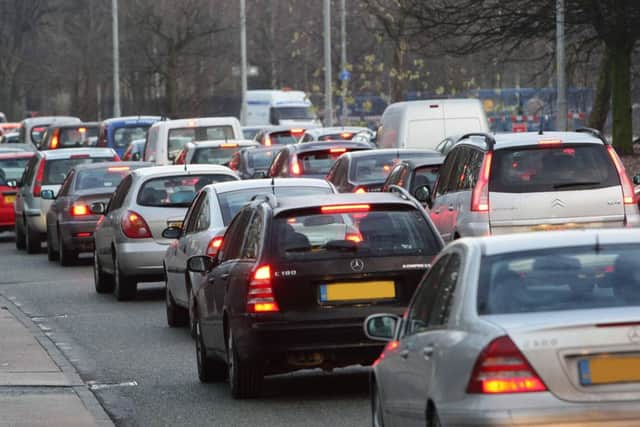Why lorry firms and taxi drivers are urging Yorkshire cities to rethink planned Clean Air Zones
Air pollution is often described as an “invisible killer”; a problem that can’t be seen but contributes to tens of thousands of deaths around the UK each year from cancer, strokes, heart disease and asthma. Yorkshire is no stranger to the problem, with more than 200 places around the region suffering illegally-high levels of nitrogen dioxide, a gas produced by diesel vehicles which can decrease lung function.
Politicians at a national and local level hope that one of the solutions to the issue is the widespread introduction of ‘Clean Air Zones’ designed to prevent the highest-polluting vehicles entering the worst-affected areas for air quality, mainly in city centres, and encourage uptake of more modern and less-polluting vehicles.
Advertisement
Hide AdAdvertisement
Hide AdCities have been put under pressure by Westminster to reduce nitrogen dioxide levels following court rulings demanding the Government does more to reduce air pollution. The Government had been obliged to address poor air quality since legislation came into force in 2010 – but has been forced into concerted action following a series of legal challenges by non-profit environmental law organisation ClientEarth.


As a result, Leeds and York councils have already agreed to introduce such zones, while Sheffield and Bradford are among those considering them. Yorkshire leaders joined colleagues from across the country earlier this week in calling on Chancellor Sajid Javid to provide an extra £1.5bn towards establishing the zones. However, he was silent on any specific backing during Wednesday’s Spending Round announcements but did commit to providing “£30m of new money to tackle the crisis in our air quality”.
London has run a series of schemes designed to cut traffic levels and pollution since introducing a congestion charge in 2003, with the most recent version being an Ultra-Low Emission Zone which was introduced in April this year inPAvolving a £12.50-a-day charge to drive into central London to all but the most environmentally-friendly cars and vans. A series of other cities are considering similar schemes – but not everyone is convinced such zones are the answer to the country’s air pollution problems.
“Our opposition is not to cleaning the air, we absolutely support the need to improve air quality. The industry have been taking huge steps to do that over the years,” says Natalie Chapman, head of urban policy for the Freight Transport Association. “But Clean Air Zones are a stick approach that hurts those who can least afford to upgrade their vehicles, particularly small businesses.”
Advertisement
Hide AdAdvertisement
Hide AdChapman says one of the key problems for those who work in the logistics sector is the difference between how each individual zone will operate. For example, in Leeds its planned zone only affects lorries, taxis, buses and coaches but covers a wide geographic area to the north of the city, while Sheffield’s proposed zone is more city-centre focused but also includes charges for vans.


“As an industry many of our members operate nationally,” she says. “There is this patchwork of different cities planning to do different things so you need to know all the different systems. The plan for Sheffield is more city-centre focused, which is good. But it will have an impact on businesses which operate fleets. The bigger the zone, the more businesses get caught up in it. Sheffield isn’t so bad but there will be businesses within the boundary. Leeds is a huge zone covering the whole of the north of the city.”
Under both the Leeds and Sheffield plans, lorries with the most up-to-date and environmentally-friendly Euro 6 engines will not be charged, with the same standard applying to vans in Sheffield. But Chapman points out that Euro 6 engines have only been introduced for new vans since September 2016 – meaning ones that are little more than three years old will be subject to charges. While funding is available to help with the costs of fleet replacement – in Leeds up to £16,000 will be provided towards the cost of a new HGV – Chapman says that does not go far enough with new lorries costing between £70,000 and £80,000.
“Clean Air Zones also have a real impact on the resale value of Euro 5 vehicles,” she adds. “If the period you plan to run it for is shortened and the value is much less than you expected, that will have an impact.”
Advertisement
Hide AdAdvertisement
Hide AdThe FTA believes alternative policies such as incentivising the uptake of alternatively-fuelled and electric commercial vehicles, improved congestion management and retiming deliveries so that lorries and vans are not heading into city centres at rush hour could all assist.
“There are currently lots of restrictions on delivery times. Lorries are coming into city centres between 7am and 9am as people are trying to get to work. Putting those vehicles into traffic at busy times is bad for pollution and emissions.”
The FTA is far from a lone voice on the issue – the Government’s position is that if local councils can demonstrate it is pursuing effective alternative measures “other than charging zones that are at least as effective at reducing nitrogen dioxide”, they should be preferred.
Derby, Nottingham and Southampton have gone down this route although earlier this year the Government ordered Coventry to introduce congestion charges which would include older cars after rejecting the city’s own plans as not going far enough.
Advertisement
Hide AdAdvertisement
Hide AdSheffield’s recent consultation on its intended Clean Air Zone exemplifies the difficulties facing councils. Almost 12,000 people had their say on proposals to charge £50 a day for buses and £10 a day for taxis, lorries, vans and coaches – with taxi drivers arguing the policy will put many of them out of a job while Sheffield Green Party argued that cars should be charged for the zone to have any impact. As Labour cabinet member Bob Johnson put it: “Air pollution is a big issue and people want clean air. However we have to ensure that food can still be delivered, that buses still run and children can get on a coach for a school trip.”
More than 100 taxi drivers in Sheffield have reportedly quit the trade because they can’t afford new cabs to meet clean air standards. Former councillor Ibrar Hussain, speaking on behalf of taxi drivers, told a council meeting this week that a new electric black cab costs £58,000. “This is about people’s livelihoods, not politics,” Mr Hussain said.
There have also been practical as well as political problems in introducing the zones. The Leeds scheme was due to start in January but along with Birmingham it has had to delay its introduction due to problems with the Government’s vehicle checking software due to be used to recognise registration plates and administer the scheme.
ClientEarth’s Head of Public Affairs Simon Alcock says: “This country has been blighted by illegally poor air quality for nearly a decade. It is vital that this crisis is solved in the shortest possible time – and that’s what national courts have ruled. The Government’s own research shows that Clean Air Zones are the quickest and most effective way to bring down illegal and harmful levels of air pollution. But while councils are bringing in Clean Air Zones, the Government needs to be helping people and small businesses move to cleaner vehicles now. This is a consumer scandal as well as a public health crisis. We were all encouraged to buy the diesel vehicles that are now making us sick and it’s incredible the Government is not doing more.”
Government defends record on air quality measures
Advertisement
Hide AdAdvertisement
Hide AdThe Government says it is taking firm action to improve air quality across the country.
A spokesman said: “We know the impact air pollution has on communities around the UK, which is why we are stepping up the pace and taking urgent action to improve air quality.
“We are working hard to reduce transport emissions and are already investing £3.5bn to clean up our air, while our Clean Air Strategy has been commended by the World Health Organization as an ‘example for the rest of the world to follow’.”
The planned York CAZ will be introduced from January and focus on buses, with the delayed Leeds scheme expected at some point in 2020. The proposed Sheffield scheme would start from 2021.